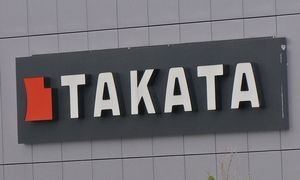Takata Agrees to Pay $70 Million Fine for Defective Airbags

The agreement with the National Highway Traffic Safety Administration calls for a total civil penalty of more than $200 million, with $130 million in payments becoming due if Takata violates the terms of its consent order or U.S. auto safety laws.
As part of the settlement announced, Takata admitted that it was aware of a defect but failed to issue a timely recall. The agreement will require Takata to operate under stricter regulatory scrutiny for five years, including an independent safety monitor selected by NHTSA to ensure compliance with the order.
“For years Takata has built and sold defective inflators. It refused to acknowledge they were defective. It provided incomplete, inaccurate, and misleading information to NHTSA, to the companies using its inflators and to the public,” U.S. Transportation Secretary Anthony Foxx said at a press conference.
Foxx also said that Takata must recall all inflators that have used ammonium nitrate unless the company can definitively prove to NHTSA that the chemical is safe for the life of the vehicle -- a prospect that Foxx said the government currently doubts.
“We believe this chemical is a factor in these ruptures, and the combination of Takata’s delays and denials, plus unexplained issues with ammonium nitrate inflators not already under recall leave us without confidence in these products going forward,” Foxx said.
“We are ordering Takata to phase out production of new inflators using ammonium nitrate and unless new evidence emerges, the company will have to recall all of its ammonium nitrate inflators.”
Takata statement
In a statement, Takata CEO Shigehisa Takada said the consent order was an “important step forward” in Takata’s work to rebuild trust with automakers, regulators and consumers. He said it also marks a “pivot point” for the company to move to a new generation of inflators in an orderly fashion, as the deal requires Takata to wind down its use of ammonium nitrate-based inflator propellant.
“We deeply regret the circumstances that led to this Consent Order,” Takada said. “We will comply with all aspects of the settlement and are committed to being part of the solution.”
Shortly after the press conference American Honda -- Takata's largest customer -- issued a statement saying a review of internal Takata documents revealed evidence suggesting the supplier “misrepresented and manipulated test data” for some of its airbag inflators. Honda also said that no new Honda or Acura vehicle under development will use frontal-driver or passenger-side airbags from Takata.
Unsafe propellant
The case involves a defect in the airbag inflators that can cause them to explode violently upon deployment and spray metal fragments into the passenger cabin. Chemical experts have said the ammonium nitrate-based propellant used in the Takata inflators is unsafe to use in airbags and suspect that it’s central to the cause of the inflator ruptures, which are linked to eight deaths and more than 100 injuries.
Takata is barred from signing new contracts that use the propellant chemistry and must end its use in current deals by the end of 2018.
Separately, NHTSA ordered the 12 automakers involved with the Takata airbags recalls to prioritize their replacement repairs according to risk factors detected in airbag testing, and sets a timetable for completion. Testing has shown that inflators in vehicles exposed over years to high temperatures and humidity are at the greatest risk of exploding.
The agency, which has taken on the extraordinary role of coordinating the recall effort, has been frustrated with the pace of progress in replacing the 23 million defective airbag inflators.
Related News


